Off Air
a magazine by WPIR Pratt Radio
Written and Edited by Zac Wiczek
Photography by Nur Güzeldere
Interview 10/4/23
Last week we interviewed Lowertown, a sizzling, independent New York indie band—in anticipation of their new EP Skin Of My Teeth, dropping October 27th. In conversation with Olivia Osby and Avsha Weinberg, we discussed their upcoming European tour, the nature of live performance, social identity in both the physical and digital world, living in New York, and musical influences. As the band prepares to travel overseas, they open up about the new confidence they’ve found as musicians.
So I’m here today with Lowertown. You’re Atlanta-based? You two met in Atlanta?
O: I would say we’re from Atlanta but we’re more based in New York. Or like both, split.
A: But yes we met in Atlanta in high school. In math class right?
O: Yeah. You know what’s up.
(Laughter)
What types of tunes do you play?
O: It’s hard to pin it down I guess because it’s always changing. I mean the broad umbrella, you could say, is Indie Rock music.
A: Uh, yeah. Rock music!
O: Indie punk, or punk, electronic, folk. I don’t know. Our live performance is more punk than anything at the moment.
Yeah, putting genres on stuff is kind of annoying.
A: Yeah.
O: It’s weird. We’ve been through so many different phases that it’s hard to say what we are.
A: I’m trying to figure out a good answer to that because I feel like a lot of people now are doing the, you know, “it’s hard to be like...”
O: “It’s hard to categorize my music! Because like it’s just so groundbreaking that you can’t really say it’s anything else you know...” It’s original.
You’re getting ready to release a new EP in the next couple of weeks, which is called Skin Of My Teeth?
O: Yeah!
Can you tell me about the title?
O: I mean, I feel like this EP is a closing of a chapter and an opening of a new era. It’s the first thing we’re releasing independently since high school. That saying always rings through my head. This year has been really crazy for us and it’s had a lot of ups and downs. There’s always just something crazy happening and we’re always somehow scraping by and figuring it out. As a band, we’ve sort of hung on by the ‘skin of our teeth’ through a lot of the shit. This EP feels a little bit triumphant…
A: Mhhmm.
Are you more comfortable now? Or sort of reaching the end of the tunnel in that regard?
O: I feel like music, at least being a musician professionally and being an artist, life in general... There’s a lot of peaks and valleys and it’s just never a stable thing. I think right now we have things figured out and it feels pretty stable, but that will probably change in an instant. You never know what’s going to happen.
A: Yeah, being a musician is like instability.
O: It’s just constant.
A: I think stable for us would be like three months of calm.
O: Or just knowing what is going to happen. We know we’re gonna go on this tour, which feels stable.
Yeah tell me about that. You’re going to Europe in the next few weeks right?
O: Yeah it’s soon. I’m really excited about that. It’s our first time in Europe touring. I think we have people over there who don’t know about us that will understand us. And I think there are people there that already know of us, that have been waiting to see us play. I also just love it there. I feel calmer. I feel more centered.
A: Yeah, I think we also want to like lay the groundwork for…
O: Coming back again.
A: Coming back again. And for a headline tour, and people who know us that have seen us play, cause I think our new music is much more performance driven. I Love to Lie, the record before the last, is a very “live” record…
O: I feel like it sounds best when it’s done live. People get the songs more once they see them performed.
A: Yeah. We’ve definitely done that in the United States and we want to give it a shot in Europe.
You said that, two albums ago, you felt like the songs sounded better when performed live. Did you write that album anticipating this?
O: I think we just got better at performing that kind of music through practice. Honestly it’d be cool to re-record the album another time and do another version... Like a live version.
A: Yeah. I wouldn’t say it sounds better “live...”
O: It’s just different. It carries a lot of energy.
A: It has a lot of energy that is “felt.” And I think that we’ve built upon it with our live performance. A lot of the beauty can be transmitted through the recording. And there is obviously a live aspect to the other stuff too but, the energy is something best conveyed live when you see us, and you see our performance.
O: I feel like a lot of punk music is like that. I’ll listen to punk online or whatever, but it's just so different. A lot of people don’t listen to the punk bands they go to shows for. They’re just like, “Oh this is awesome!” It feels just good to be here.” As a result of moving to New York and seeing all these really inspirational shows... just naturally, we made music like that, because it was incredibly inspiring to us. Before we were sort of isolated.
So you’ve been publishing music for...?
A: Five years. Since 2018.
And when did you start performing live?
O: We started performing together before we put out our first song. I had a solo project and Avsha played with me, cause I couldn’t really play guitar.
A: I was also playing music in a kind of “scene band" in Atlanta.
O: Yeah. But together we’ve played since we were seventeen. We went to your show a couple of weeks ago and you had an energy that was super exciting. Not every performer can carry that on. But you’ve been performing for some time now, and you have it. And it feels like it’s still growing.
What is the motive there, what’s keeping you going?
A: Yeah it’s actually kinda the opposite way. We started playing when we were young and insecure (we’re still young and insecure), but we were really young and insecure. We were just building our performance. This energy is new. We feel more confident in ourselves. It’s a little bit more clear to us how we want to be presented live. But it also comes with practice. It’s not like we started out with a lot of energy and kinda fizzled out. I think that will probably come later on when we get ten-plus years of performing…
O: And then you take a break, and then you come back.
A: But right now I think we just found ourselves as a live band.
O: We feel that every show is like life or death sometimes. We’re just trying to give everything and also win people over. I think we’ve done something recently that feels really good and we’ve worked really hard to get to this point, performance-wise. We try to give it our all every night.
Cause we’ve also seen a million shows and there’s some people who just seem like they don’t even want to be performing. And I get that, because if you’re on tour there are some days you don’t want to be there, but you have to do it. And it’s sort of a bummer if you pay to see someone, and you’re really excited and you really care about their music and then you just can tell they’re like... “fuck you.” I think it’s cool to have an element to a show where you’re getting something out of it, something more than just listening to the song on a streaming service. I like to make shows a whole experience, or something to talk about, something that you’ll remember.
And we just get really bored easily, so I feel like we try to have fun with it. We’re way less self-conscious now, cause so much stuff has gone wrong for us on stage that we just don’t care.

You said you’re more of a New York band rather than an Atlanta band. What about New York draws you? What’s unique about the city that you can’t get anywhere else—as musicians, as performers?
A: I think the nonstop quest to find new sounds, to be something different. A lot of people criticize others who are trying to be unique, but I think that’s how a lot of new cool stuff is found. New sounds, feelings, and art emerge like that. I think that’s something that’s always been true with New York. There’s such an over-stimulation aspect of living here, where there’s so much stuff happening and all of it is really good. It pushes you to want something better, to become your best self, artistically. And that’s sort of what inspired us when we first came here. We were seventeen and played a show here, and we got a taste of the music scene, the feeling of what it was like to perform here, and it kind of completely took us away.
O: I agree. I think it’s really difficult to live here. It’s like not easy at all. It’s intense as fuck. It’s expensive. And you’re just always on guard. But everyone who’s here really wants to be here and it feels like everyone is trying to prove themselves. It’s almost competitive in a way. Everyone’s trying to be their best self and put out the best stuff, and it makes you want to be the best. There’s a sense of urgency to people and artists in New York. I feel like things do move so fast here, and phases of art and music move so fast. It sorta puts a fire underneath you. It’s just so inspiring.
Also, the communities are really strong here. People are very competitive in a destructive way, but at the same time, everyone knows how hard it is to live here—so everyone’s sort of got each other’s back if you find the right community. The people that we hang around are some of the most giving people I’ve ever met and, even when they’re in a position where they don’t have a lot to give, they will give it to you, and protect you, and support you, and that’s honestly invaluable.
How do you feel about your growing popularity, and how are you treating it on both the internet and in your own social, physical world?
O: Our live draw is like the highest it’s ever been. Sometimes you’ll just have passive listeners that hear you off of playlists and they don’t really care, are not going to check you out, don’t know who you are. Then you have people who see you in the flesh and know the words to your songs. The internet’s a really powerful place but it’s also very misleading... There have been points where my Instagram went all crazy and shit and I’m really popular. But people don’t care, like that doesn’t translate to in-person.
The thing I’ve been most rewarded by recently is the physical interactions I’ve had with people. I think this is the first time in my life I feel confident playing shows in specific areas. I know there will be people that come and are really excited to see us... I feel like our groundwork as people, and playing music live, has finally paid off. That’s the stuff I pay attention to more, cause honestly social media’s been not my favorite place recently. It just feels draining and fake.
A: Figuring out the internet with music is really hard because it’s super new. Nobody really knows the best way to go about it, but a lot of people are claiming to know, and will make you pay them to tell you their secrets, which aren’t really secrets at all. But it’s interesting because you have older people who are telling you, “We know the secrets to this. We’ll tell you how to successfully make a band with social media...”
O: I’m like bro you only have a Facebook account.
(Laughter)
A: But in reality, the younger people know more than the older do. Every single person that’s born now is going to know way more. Twelve-year-olds know more about trends. People are scrambling to try and figure out the key to it, and it’s backwards, basically. The older people don’t really know what to do about it because they want to make money, and the younger people don’t know what to do because they’ve never had this much power before.
O: Yeah, and internet fame is such fuckin’... it’s silly. What I’ve realized matters more, and what makes me feel like what I’m doing is actually rewarding, or is important or whatever, is having people be there for you and care, face-to-face. It’s so easy to get viral, and so easy to have a song blow up. Some of my friends, their songs will blow up, and they’ll have like 500k monthly listeners or more, and then they’ll throw a show, and they’ll feel underwhelmed by it. The stuff I’ve been trying to fixate on more is the stuff I can control, and that’s what I put out into the world physically. I just want to focus on what actually makes me happy and what makes other people happy—which is art of substance, instead of like, hot Instagram pictures, or making TikToks.
In previous interviews Olivia, you’ve said you’re a more extroverted person. Avsha, you’ve said that you’re more of an introvert. But you’re both performers, and that’s inherently an extroverted thing. You’re making yourself vulnerable on a stage, in front of a crowd of people, most of whom you’ve probably never met. Is performing a transformative experience, do you feel like a different person? What is that for you?
A: Yeah that’s a good question. Performance is a lot more selfish than people think. To me it doesn’t feel like a social experience, not in the sense that you are interacting with individual people. I don’t feel like I have the same part of my brain on as I do when I’m meeting a group of people. Music in general is selfish. You’re kind of living out what you’re envisioning in your head, the art that you’re seeing and feeling. I don’t feel extroverted because I perform. I think I’m really internal when I perform. I’m getting a little bit more extroverted, I’m trying to get better about it.
O: I was totally capping when I said I was extroverted.
(Laughter)
O: I am so not extroverted at all. Like I’m super introverted. I came to this realization recently: I’ve always been an introvert, and I pretended I was an extrovert because I’m so socially awkward and anxious, and when we moved to New York I was like, “I want to be socially extroverted.” But I can’t force that upon myself. It drains me, and I’ll go months at a time where I won’t talk to anybody outside of my apartment. I’m really good in short bursts, and I love hanging out with people and talking to people. I get a lot out of that.
But in reality, I’m just an introvert pretending. On stage, I just get into a character and I pretend I’m someone completely different. It feels really freeing. There’s no judgmentnon who I am, there’s only judgment on this character that I’m playing. So if I fuck up or if I do something embarrassing, it’s not me that they’re judging, it’s just this character. I definitely think that the makeup and all the stuff that we do... it helps me separate myself from the performer.
We were talking about Stop Making Sense earlier and the performative nature of that live show. You mentioned your interest in developing Lowertown’s live performance eventually. You have this persona, at least you Olivia, that’s separate from your internal social life. Do you want to keep it this way? Are you afraid of molding the two?
O: I just don’t think that person would exist outside of a “show” context. It’s very draining, and also so different from something that’s socially acceptable. Like I don’t wear shoes, I wear complete, crazy face makeup, and sometimes barely any clothing. It’s something that wouldn’t be able to exist outside of a performative context, which is easy for me. And I like that.
A: I think I would like to make something that continues to inspire me, that the younger me would find inspiring. I kinda wear my heart on my sleeve. I’m pretty personal. I’m not super... like in a character on stage.
O: That’s harder in my opinion.
You took your pants off during the show.
A: Yeah!
(Laughter)
O: He didn’t take his pants off though. Actually Lloyd…
A: To be fair Marsha did take my pants off.
O: Oh Marsha did, yeah.
A: Marsha took my pants off. And then Lloyd took my pants…
O: And wrapped them around his head.
A: But yeah I’m always... I think even on social media, I’m pretty open about my thoughts and I’m a much more “stream of consciousness” person. Cause I feel like I benefit more from it. I learn more about myself and I feel more like I’m creating, more connected to my art.
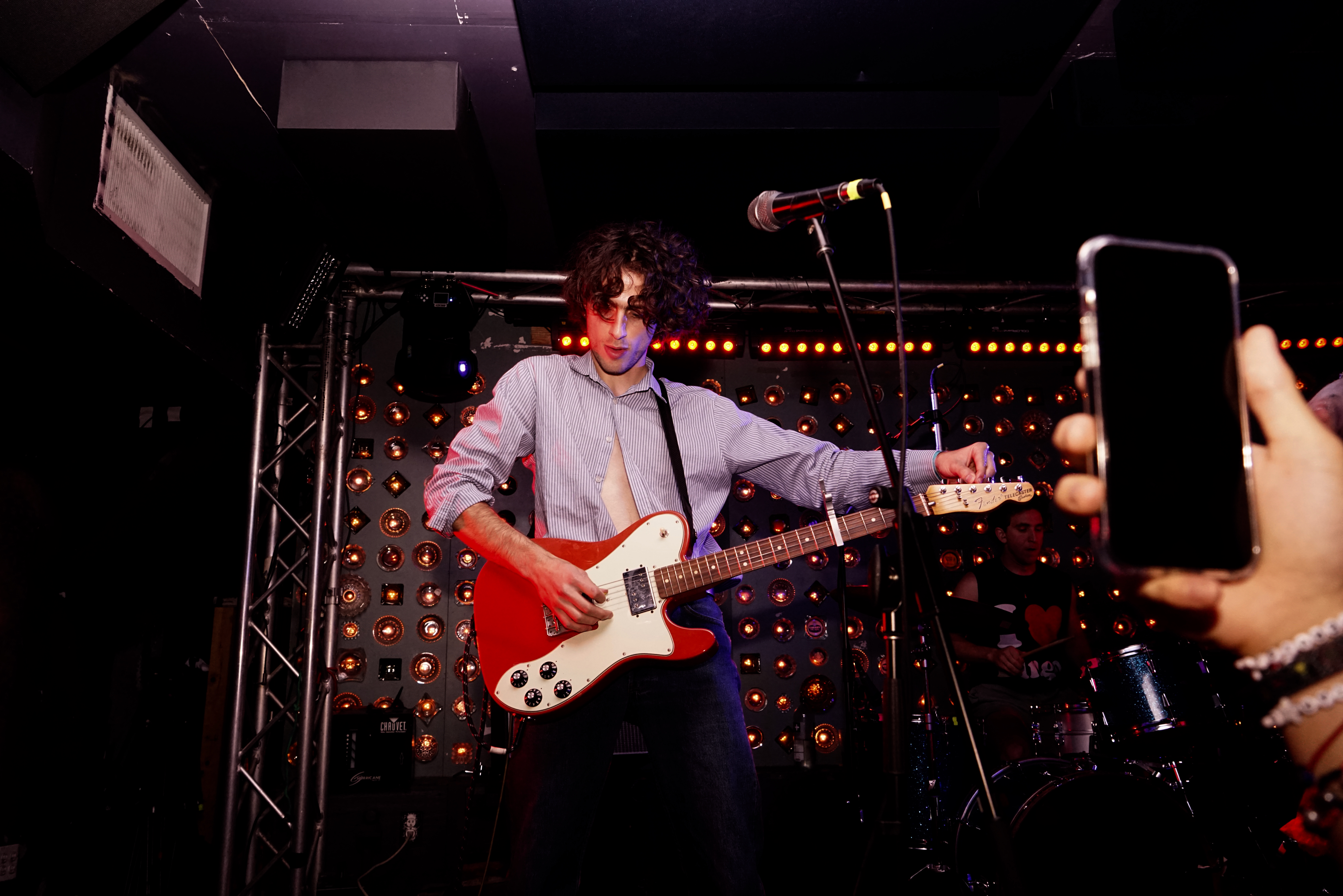
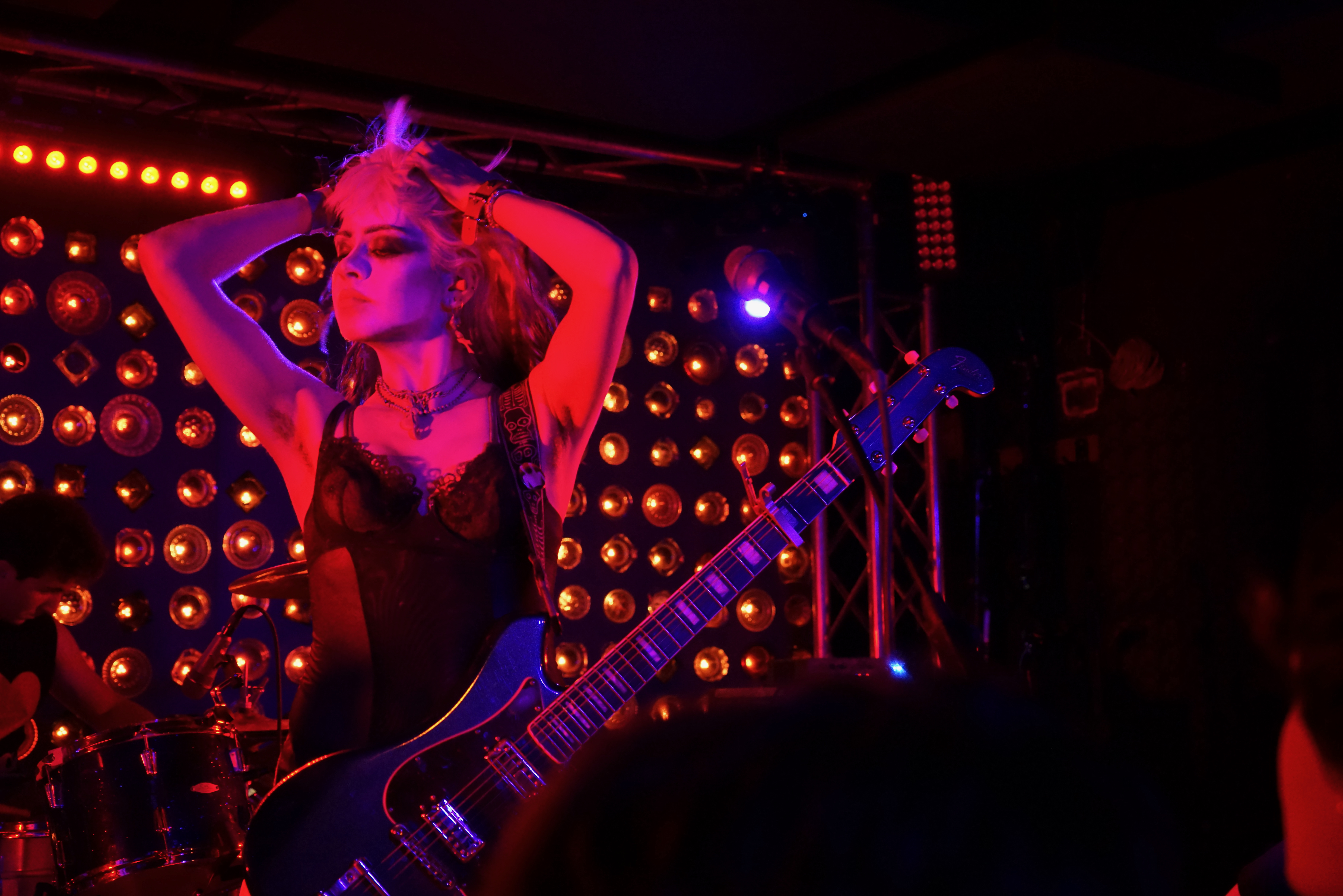
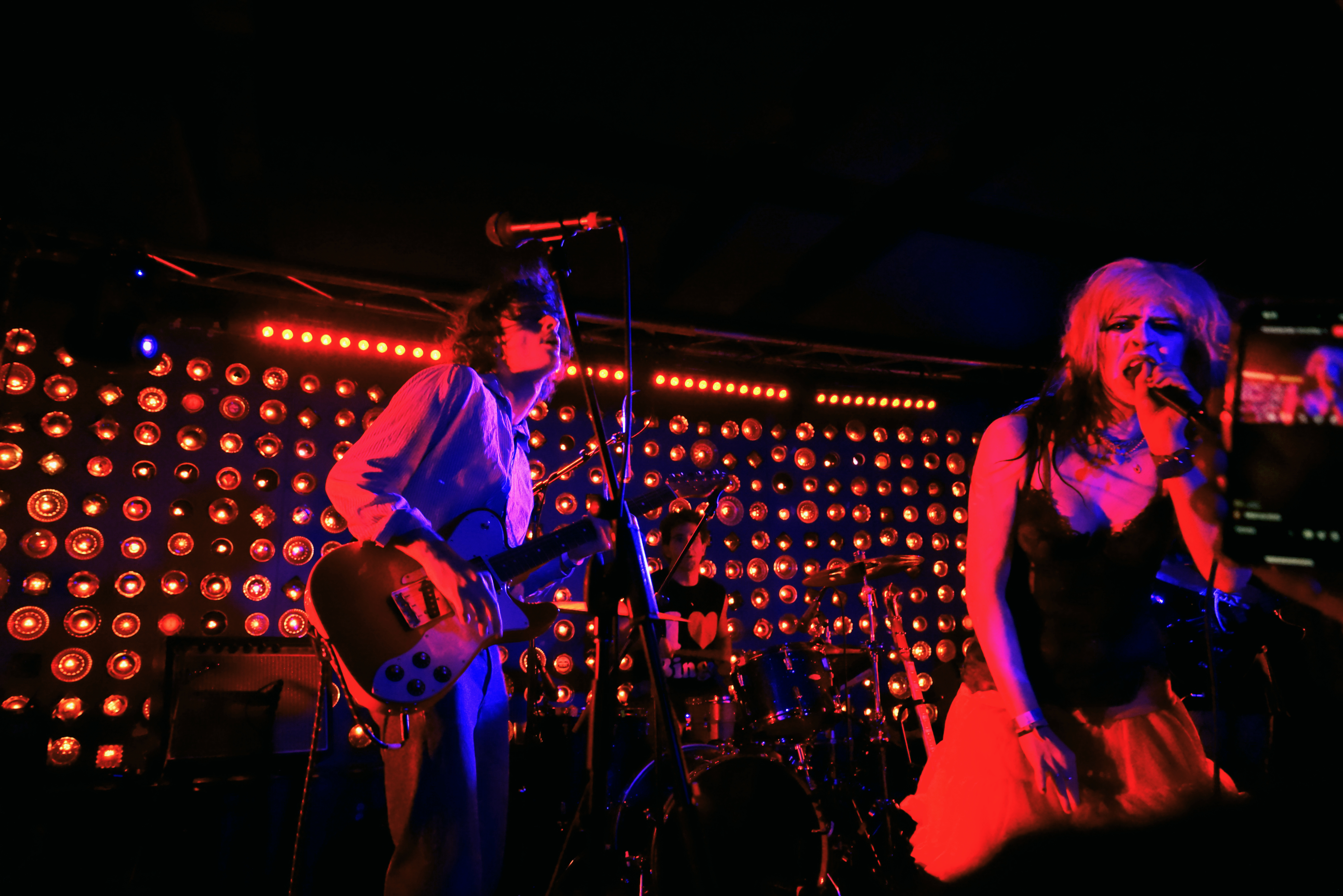
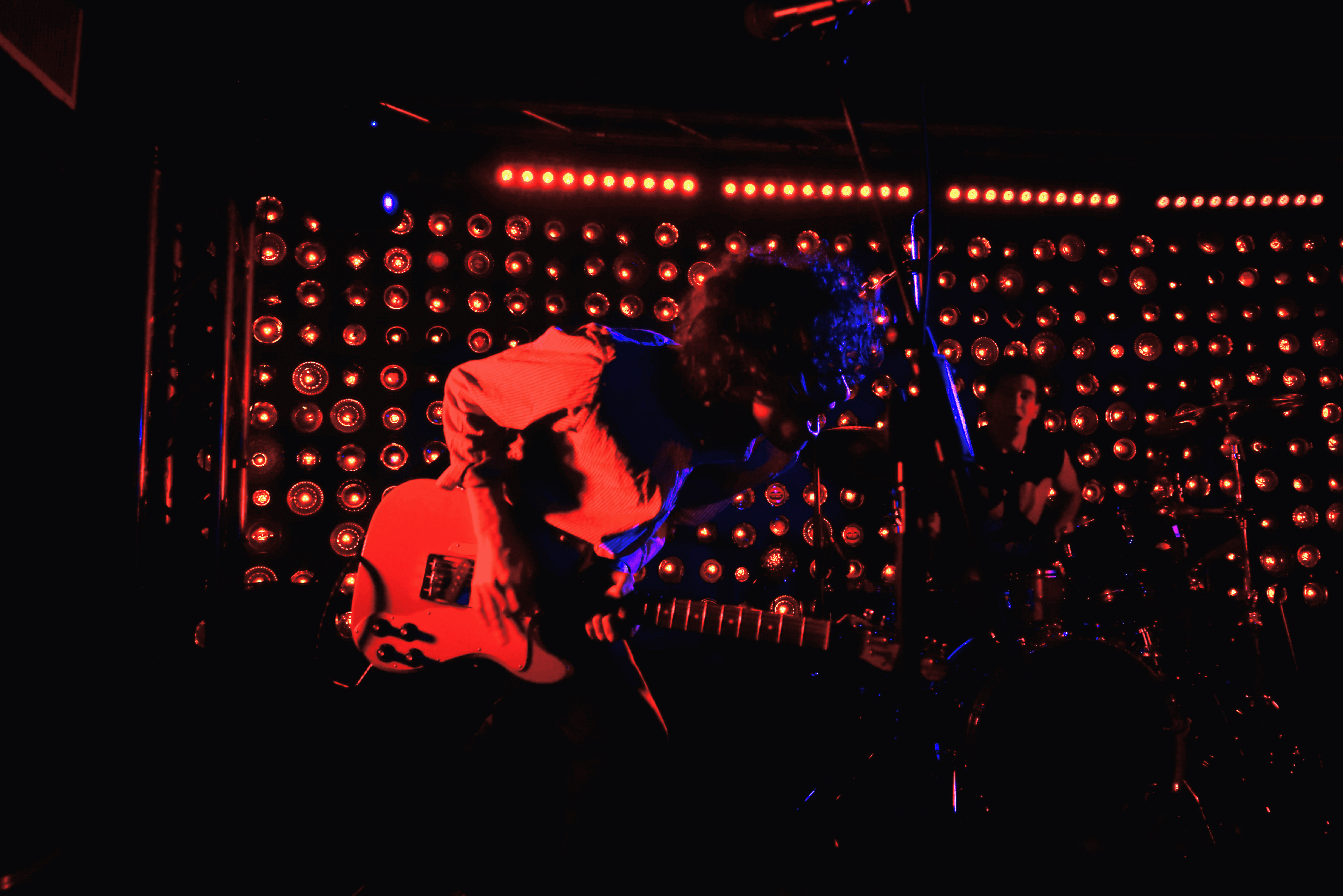
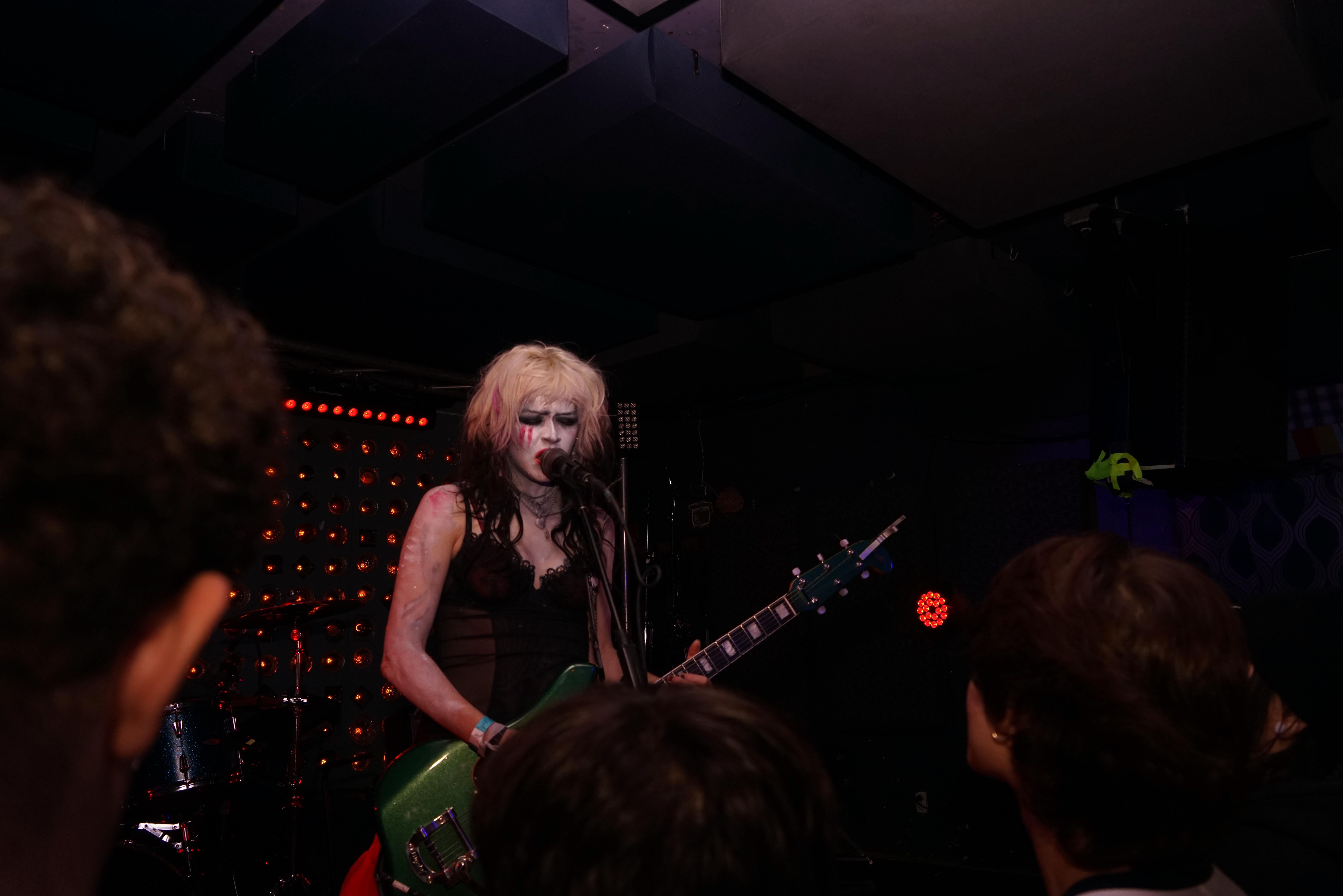
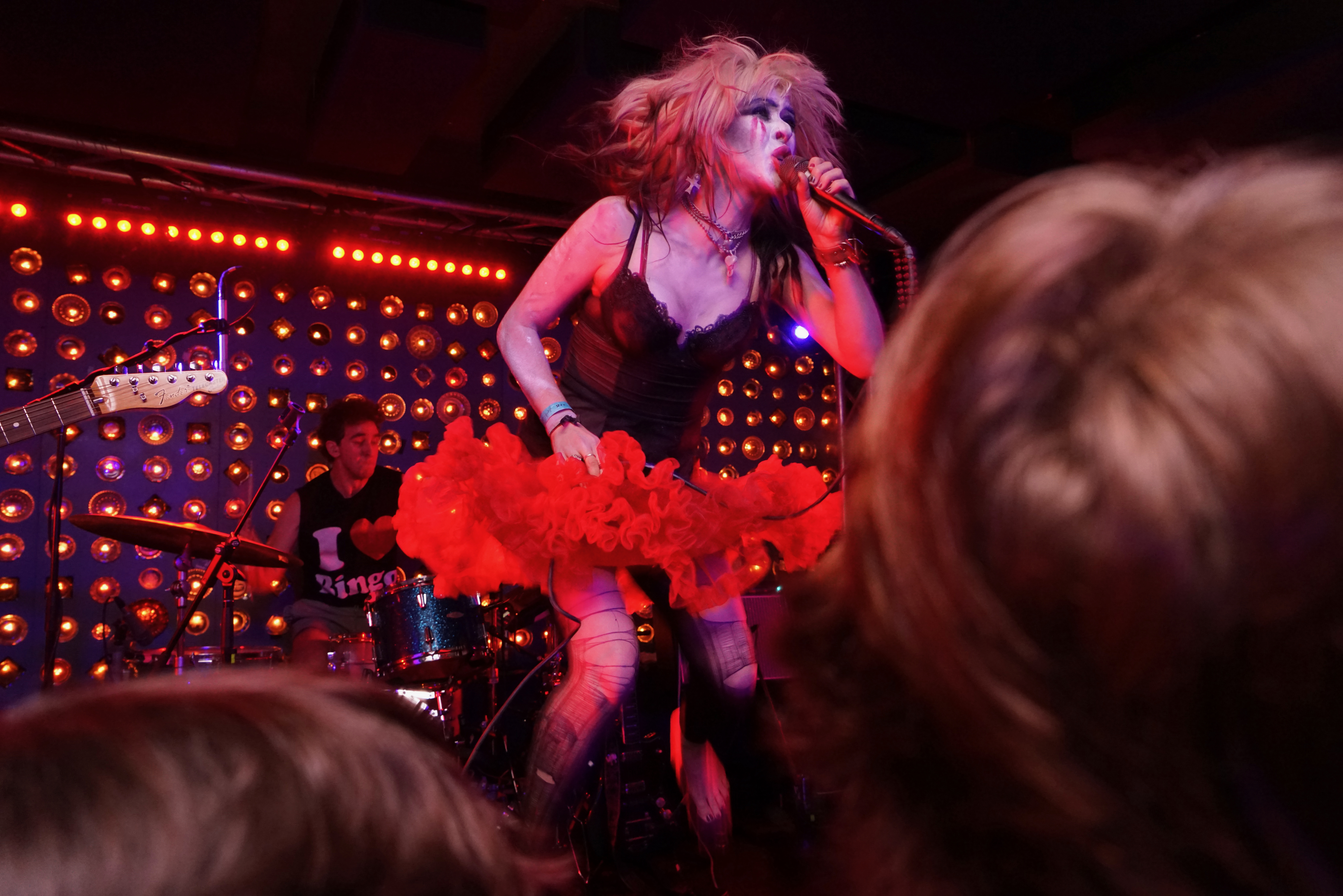
Lowertown performing at Baby’s All Right on 9/20/23
What’s your creative process like, for writing, and recording? Are you in studios most of the time?
O: It changes a lot.
A: Usually at home.
O: We write the idea, the core idea of a song, separately from each other. And then we start ping-ponging it back and forth. We’ll show each other sort of the beginning of a song idea, and then the other one will be like, “Yes!” or, “I don’t know about this one.”
A: Yeah. We start independently and get closer and closer together. We’ve definitely experimented with different writing methods over time. We kind of separate ourselves. I would send her this instrumental thing, and she would work on it in a small room on her own. I think in order to channel our creative selves, independence is important.
Why do you make music?
O: Many different reasons. It’s a really good way to process emotion and it’s something productive to do with emotion. I’m extremely, extremely emotional. I feel things very intensely, and I’ve noticed that it’s the best coping mechanism. I can either do something destructive with emotion, or I can create something. And a lot of the time I don’t even put the stuff that I make out into the world, but I’ve realized, fuck it, why not put it into the world? Also, it’s fun and it feels really good. I’m better at it now, and there’s always something exciting that I want to try.
A: I grew up playing piano. So it’s always been the way that I get my feelings out. That was always like the number one option for me, but I grew up playing classical piano which is way more rigid. I always tended towards the more romantic era. So you'd have a little bit of emotional breathing room to be unique, but it’s pretty straightforward. You have to play what you’re reading. I didn’t really discover the emotional nature of music or the ability to express yourself until I started to branch out.
What caused you to branch out in the first place?
A: I had a kind of reckoning with my piano teacher. I was fourteen or fifteen. I’d been playing since I was four, and I was like, “I want to play it this way,” and he’s like, “You can’t play it that way.” I did it anyway at a performance and I messed up. I was so embarrassed, and I felt so terrible. Liv was actually…
O: I was at your last one.
A: Liv was at my last recital.
O: It was really emotional.
A: I’m still trying to figure out my relationship with piano and music in general, cause I have a really long relationship with it, that’s very complicated. But yeah, I tried to be expressive and unique, and I messed up. I felt so terrible and I was like, “I can’t do this anymore. I can’t play classical music.” But I love it. I kind of saw the dichotomy of playing music, how it first started—very rigid with rules... I still play piano and compose.
If you can write on piano, you can write on so many instruments.
A: Right. And I’m very glad that I had that experience.
O: Yeah you know so much music theory today.
A: But it caused me probably ninety percent of my pain growing up.
What would you say to aspiring musicians who may feel afraid to show their work to others?
O: Well, if you feel like you don’t have the immediate physical community, the internet is an amazing place, and that is where I started because I feel like I didn’t have a community that accepted me or took me seriously. But if you want to do it professionally, you’ve gotta suck it up and just show people music. Cause most good things are vulnerable. I used to be super self-conscious about showing people things, like my singing. Avsha forced me to sing. For our very first song, he was like, “We’re not leaving the studio until you sing in front of me.” And I was crying and stuff and freaking out, and he was like, “No. I’m literally not gonna let you leave. You have to sing I’m sorry.” And it was really important to me. It’s hard cause it’s vulnerable, but you know, this is what you want to do.
A: If you make the decision in your head that you want to be in a band and put out music, then it is going to be a “tough love” scenario. But there is a lot of merit in just making music for yourself, for creative reasons.
O: There is. And you don’t have to show it to anyone. But if you want to do it as a job…
A: I played music forever and I didn’t really show anything. I put stuff out on SoundCloud as a solo project when I was really young.
Do you think any of that material will develop down the road?
A: Yeah, I mean I’m still working on my solo stuff cause I love to write, and some things don’t feel like Lowertown. But all of my SoundCloud stuff is still there, and I have a solo EP out.
O: We have so many songs that we’ve both individually written that have just never seen the light of day, that I feel like we should just put out sometime.
A: I also have an album done. I’m trying to figure out when to release it. We’re always working on music.

Top 3 musical influences for you, individually, can be all time. What are your lists right now?
O: One that is shared between us that I am going to say anyway. Radiohead.
A: Yeah.
O: For me individually. I mean I’m a big fan of Duster, and soft vocals you can barely hear, comforting music.
A: Slowcore.
O: We have people that we know personally that inspire us. One person that I’ve met recently is Douglas Dulgarian from They Are Gutting a Body of Water. He just feels like someone who creates communities and fosters them, and that’s really important to art.
A: My favorite classical composer was Chopin.
O: Animal Collective.
A: Animal collective was a group one, like when we first started.
O: Aphex Twin’s important.
A: Yeah that was a big shared one between us. I think electronic music is my favorite.
O: Also, there’s a lot of shit on Bandcamp that I grew up listening to and SoundCloud that probably has 300 plays but I was just obsessed with underground, DIY music. That’s what made me want to make my own music in the first place.
A: Growing up, Coldplay was my favorite band.
O: Truuuuee!
A: I won’t say that they inspired my music consciously, but absolutely subconsciously, the first two albums.
You have some memories of Coldplay.
A: Oh yeah! I mean, I usually do the driving on tour and will always…
O: It’s like 5 in the morning or something…
A: If it’s a late drive, I’ll do Parachutes or A Rush of Blood to the Head.
O: Lounge Lizards, I’m obsessed…
A: Oh true.
O: I’m obsessed with John Lurie. He’s the biggest “artist” artist I know. Like every cool person I respect is like, “He’s my favorite musician.” And I’m obsessed with him and his memoir. It’s so inspiring.
A: They were part of the New York scene in the 70s. Just after Warhol.
O: Yeah. Freaks of nature and really weird jazz and just very interesting. They did a lot for the scene and stuff.
Is there anything you want to add before we wrap?
O: Yeah. We just put out a song called “Bline.” We have a new song coming out October 18th called “Root Canal.” And our EP is coming out October 27th. They’re all epic, listen to them!
A: Do it. And if you’re in Europe, we’re going to Europe.
O: And if we’re in Europe we’re going to Europe.
(Laughter)
O: One that is shared between us that I am going to say anyway. Radiohead.
A: Yeah.
O: For me individually. I mean I’m a big fan of Duster, and soft vocals you can barely hear, comforting music.
A: Slowcore.
O: We have people that we know personally that inspire us. One person that I’ve met recently is Douglas Dulgarian from They Are Gutting a Body of Water. He just feels like someone who creates communities and fosters them, and that’s really important to art.
A: My favorite classical composer was Chopin.
O: Animal Collective.
A: Animal collective was a group one, like when we first started.
O: Aphex Twin’s important.
A: Yeah that was a big shared one between us. I think electronic music is my favorite.
O: Also, there’s a lot of shit on Bandcamp that I grew up listening to and SoundCloud that probably has 300 plays but I was just obsessed with underground, DIY music. That’s what made me want to make my own music in the first place.
A: Growing up, Coldplay was my favorite band.
O: Truuuuee!
A: I won’t say that they inspired my music consciously, but absolutely subconsciously, the first two albums.
You have some memories of Coldplay.
A: Oh yeah! I mean, I usually do the driving on tour and will always…
O: It’s like 5 in the morning or something…
A: If it’s a late drive, I’ll do Parachutes or A Rush of Blood to the Head.
O: Lounge Lizards, I’m obsessed…
A: Oh true.
O: I’m obsessed with John Lurie. He’s the biggest “artist” artist I know. Like every cool person I respect is like, “He’s my favorite musician.” And I’m obsessed with him and his memoir. It’s so inspiring.
A: They were part of the New York scene in the 70s. Just after Warhol.
O: Yeah. Freaks of nature and really weird jazz and just very interesting. They did a lot for the scene and stuff.
Is there anything you want to add before we wrap?
O: Yeah. We just put out a song called “Bline.” We have a new song coming out October 18th called “Root Canal.” And our EP is coming out October 27th. They’re all epic, listen to them!
A: Do it. And if you’re in Europe, we’re going to Europe.
O: And if we’re in Europe we’re going to Europe.
(Laughter)
More images from our shoot with Lowertown:







This interview has been edited and condensed for clarity and length.
︎ ︎︎